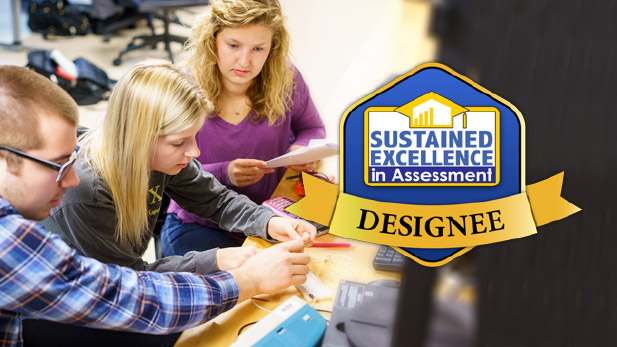Assessment Practices Recognized for Sustained Excellence

Rose-Hulman annually collects, evaluates and disseminates data about student learning outcomes to improve elements of academic programs and initiate collaborations with other colleges.
Rose-Hulman is among five U.S. colleges and universities recognized by the National Institute for Learning Outcomes Assessment for achieving sustained excellence in integrating best assessment practices and using assessment results to guide institutional decision-making and improve student learning performance.
The NILOA presented excellence in assessment designation to seven higher education institutions this year, with Rose-Hulman being among an even more exclusive list for sustained excellence after originally earning recognition in 2016. The EIA honor is the first national program designed to recognize institutions that are engaging in intentional institute-wide assessment.
Evaluation included an institutional self-study completed by Rose-Hulman administrators, faculty and staff, led by Jordan Trachtenberg, director of assessment, and Matthew Lovell, senior director of institutional research, planning, and assessment. It was followed by a peer review panel of higher education assessment experts from throughout the country.
Rose-Hulman President Robert A. Coons states, “For more than 20 years our assessment plan has collected, evaluated and disseminated data pertaining to student achievement of campus-level student learning outcomes. This information has been instrumental in the development of strategies to improve elements of our academic program while initiating valuable discussions and collaborations about assessment with other higher education institutions.”
Key elements of Rose-Hulman’s assessment program, cited by the niloa national review panel, included:
- The Office of Institutional Research, Planning and Assessment has led the institute’s systematic and processes for assessment since 1998. This information is shared with internal and external stakeholders.
- A Commission on the Assessment of Student Outcomes plays an active role in overseeing assessment procedures and best practices across the institute. This 15-member group represents faculty from engineering, science and humanities academic areas, staff from student affairs and residence life, and the student body.
- A faculty panel annually reviews more than 2,000 artifacts involving student outcomes collected through the RoseEvaluation system. Student learning also is assessed through formal accreditation processes and professional organizations, like the Kern Entrepreneurial Engineering Network. Key findings help administrators examine academic strategic strengths and areas for possible improvement.
- Interactive electronic dashboards, instead of static reports, have been expanded to become a valuable tool providing customized institutional data that’s easily accessible to decision-makers and others within the campus community.
- Expanding assessment for non-ABET accredited academic programs and co-curricular outcomes.
- Assessment has become a part of faculty and staff professional development activities, including implementation of an annual assessment day for faculty in their second year.
- Advisory boards, comprised of alumni and employers, are actively involved in assessment activities.
Coons pointed out that Rose-Hulman actually increased assessment activities within all academic areas during the COVID-19 pandemic, when many higher education institutions had to halt assessment practices. Emphasis has been given to Rose-Hulman’s undergraduate- and graduate-level non-ABET accredited programs.
“this increased participation involved defining specific outcomes and taking measurements during this challenging time. We are proud to demonstrate comprehensive assessment coverage across all programs that we offer, large and small,” stated the president.
The office of institutional research, planning and assessment includes trachtenberg, lovell, director of institutional research timothy chow, and administrative assistant brenda domeika-ponsot.